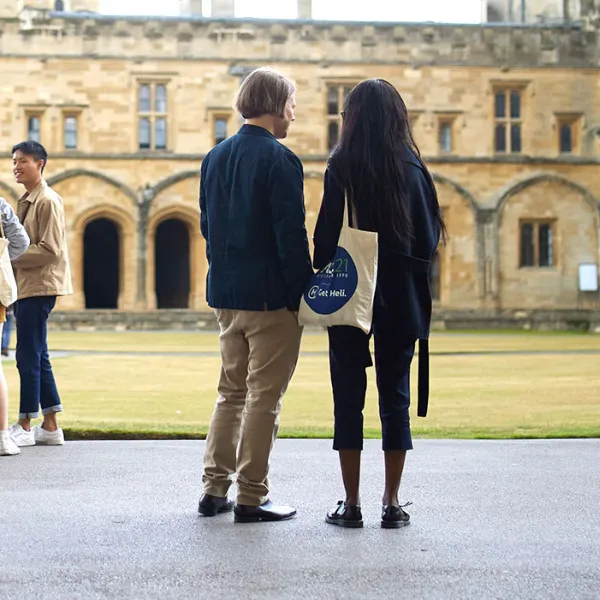Being called to interview at Oxford is a great achievement. If you're called to interview, this means we're impressed by your application and want to know more about why you want to study here.
You should see the interview as your chance to show us that you're passionate about your chosen subject and are suited to our style of teaching at Oxford. That means we're far more interested in how you think about and discuss new information than what you already know about your subject.
Scroll down to learn more about the interview process at Oxford and to read our top tips.
Interviews at Christ Church
What to expect at interview
Shortlisted candidates will be interviewed online. You will have one or two interviews at your first college and often at other colleges as well, each with at least two interviewers.
Try not to read too much into second-college interviews: in some subjects you will automatically be interviewed at a second college, while in others you may be offered that opportunity. The system of additional interviews is designed to give you the best possible chance of gaining a place, irrespective of the college to which you’ve applied.
Interviews are not intended to intimidate or catch you out, but to challenge you in order to bring out your potential. We are keen to find out not just what you already know, but whether you have or can develop the skills needed to study your subject at university level.


The format and content of interviews varies from subject to subject. You may be asked questions related to your personal statement or raised by written work you have submitted. You may be given something to read beforehand or something to examine in the interview, such as a poem (for English or Modern Languages), a source text (for History), an image (for History of Art), a legal statute (for Law), a tray of butterflies or shells (for Biology), or a mathematical or technical problem (for Physics, Engineering, or Maths).
In all cases we are not looking for instant, ‘right’ answers, but rather for ideas that will provide the basis for a discussion. We are particularly interested in the way in which you approach our questions and formulate your responses. Each week at university you will be asked to grapple with new concepts, so seeing how you process and respond to unfamiliar ideas or materials gives us a good indication of how you will manage on the course.
Naturally you’ll be keen to see what an interview might be like before you have one, so we've provided some videos of parts of mock interviews below.
Please note that going forward, all interviews will be conducted online. The following videos are intended to give you an idea of the types of conversations that take place in an interview.
Demonstration online interviews can be viewed on the Oxford University website.
-
Discussing your personal statement
Your interview may begin with a question about your personal statement. Typically, your interviewers will want to discuss how your super-curricular activities (what you’ve done outside of school that’s linked to your chosen course) and experiences feed into your academic study.
In this example you can see part of an interview with a student applying to study History. (Please note that all interviews now take place online.)
-
Discussing a text
Many humanities subjects ask their candidates to read a text in advance (with some preparation time) and then ask them to respond to it in the interview.
This type of question assesses your ability to read a text carefully, critically and imaginatively.
In this video, a Modern Languages candidate responds to a poem (click here to download the poem being discussed). (Please note that all interviews now take place online.)
-
How to prepare for interview: a tutor's perspective
All subject interviews are based on identifying potential, rather than testing your knowledge.
In this video, Professor Malcolm McCulloch (Engineering Science) discusses some tips to help you to be comfortable and do your best in the interview. (Please note that all interviews now take place online.)
-
Responding to a Maths problem
In interviews for subjects that are likely to have a strong mathematical component (for example, Maths, Physics, Engineering or Computer Science), candidates may be asked to work through a maths problem. This type of question will often see you use the maths you have studied at school in an unusual or new setting. (Please note that all interviews now take place online.)
-
Responding to a Science problem
In interviews in the sciences, candidates are likely to be asked about a question relating to their chosen discipline. These may have an element of discussion, following a problem-solving component.
In this example, a candidate responds to a Physics problem that might be asked in a Physics or Engineering interview. (Please note that all interviews now take place online.)
Further resources for interview preparation
It’s normal to want to prepare for interviews, but we think the best preparation is simply to get used to talking about your subject: you could try articulating your thoughts about something that you’ve seen or read that’s related to your chosen course, or explaining something you’ve found difficult about you subject in school. These can be chats with teachers, friends, or family members.
For more details on what to expect from an interview situation, how to prepare, sample interview questions, more demonstration interviews, and practicalities, have a look at the Oxford University website.
We wish you the very best of luck. Do feel free to get in touch if you have any questions!
email: admissions@chch.ox.ac.uk

